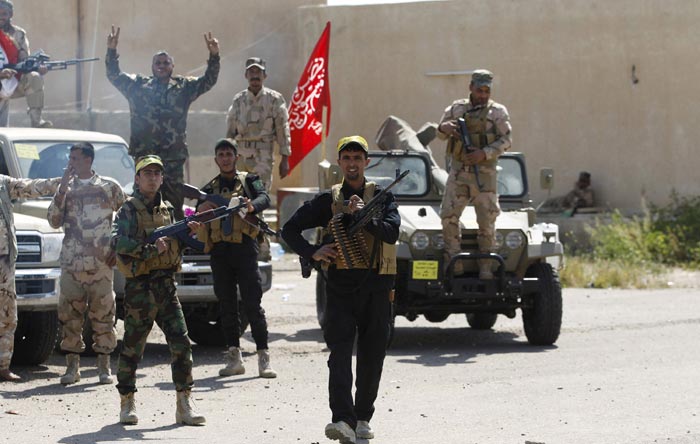Hashid Shaabi (Popular Mobilisation) allied with Iraqi forces against the Islamic State, carry their weapons as they prepare to attack Tikrit in the Iraqi town of Ouja.
AFP/Baghdad
Iraqi forces buoyed by the first US-led coalition air strikes on Tikrit made a final push on Thursday to flush diehard jihadists out of Saddam Hussein's hometown.
Washington had been reluctant to get directly involved in a battle in which Iran-backed militias have taken the lead but the Pentagon seemed keen to reassert itself as Baghdad's chief partner in the war against the Islamic State group.
The tussle for influence over Iraq came as Washington and Tehran began fresh nuclear talks and also as Iran's regional rival Saudi Arabia launched air strikes in Yemen.
The US-backed air campaign against Shia minority rebels in Yemen was announced by the Saudi ambassador in Washington and condemned by Tehran.
The operation to retake Tikrit was launched on March 2 but had failed to dislodge a relatively small number of IS fighters who have hemmed themselves in with thousands of bombs for a last stand in the city centre.
"The assault on the last (IS-held) pocket of Tikrit started from the southern front, in Awja," said a brigadier general from the military headquarters in Salaheddin province, of which Tikrit is the capital.
He said Iraqi forces were also attacking from the west and north and were repairing a bridge over the Tigris that IS recently blew up to pile further pressure from the east.
The forces involved in the fighting include the volunteer Popular Mobilisation units, Shia militia groups, the army's counter-terrorism force as well as interior ministry units.
Iraqi air strikes had, by Baghdad's own admission, not been efficient and accurate enough to break the back of IS resistance.
"Now the operation to take Tikrit really begins," one US defence official told AFP.
French and Iraqi strikes
Lieutenant General James Terry, who oversees the command in charge of the US war effort, said precision strikes would save "innocent Iraqi lives while minimising collateral damage to infrastructure."
The exact number of civilians trapped inside Tikrit is unclear but a Red Crescent spokesman last week said "no more than 30,000, probably quite a bit less."
Iraqi Defence Minister Khaled al-Obeidi said Iraqi Sukhoi fighter jets also pounded Tikrit on Thursday.
And a spokesman in Paris announced the French air force took part in the coalition raids that began late Wednesday.
"The ongoing Iraqi and coalition air strikes are setting the conditions for offensive action to be conducted by Iraqi forces currently surrounding Tikrit," Terry said.
The US military said the first wave of coalition air raids consisted of 17 strikes that struck buildings, bridges, checkpoints, staging areas, berms and a command post.
Washington had expressed strong reservations over the leading role played in the Tikrit operation by Shiite militia groups, some of which have been accused of serious abuses.
Iran's top commander in charge of external operations, Qassem Suleimani, has been ubiquitous on the Salaheddin front lines and is perceived by many Iraqis as the brain behind Iraq's ground operations.
But the Pentagon insisted Washington remained Baghdad's most precious partner in the war to reclaim the vast regions of Iraq IS conquered last summer.

